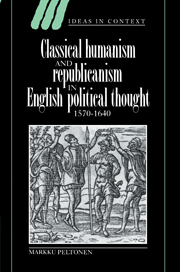Book contents
- Frontmatter
- Contents
- Note on text
- Acknowledgements
- List of Abbreviations
- Introduction: classical humanism and republicanism in England before the Civil War
- 1 Classical humanism restated
- 2 Classical republicanism in the margins of Elizabethan politics
- 3 Civic life and the mixed constitution in Jacobean political thought
- 4 Francis Bacon, Thomas Hedley and the true greatness of Britain
- 5 Thomas Scott: virtue, liberty and the ‘mixed Governement’
- 6 The continuity of the humanist tradition in early Caroline England
- Epilogue
- Bibliography
- Index
- IDEAS IN CONTEXT
6 - The continuity of the humanist tradition in early Caroline England
Published online by Cambridge University Press: 02 December 2009
- Frontmatter
- Contents
- Note on text
- Acknowledgements
- List of Abbreviations
- Introduction: classical humanism and republicanism in England before the Civil War
- 1 Classical humanism restated
- 2 Classical republicanism in the margins of Elizabethan politics
- 3 Civic life and the mixed constitution in Jacobean political thought
- 4 Francis Bacon, Thomas Hedley and the true greatness of Britain
- 5 Thomas Scott: virtue, liberty and the ‘mixed Governement’
- 6 The continuity of the humanist tradition in early Caroline England
- Epilogue
- Bibliography
- Index
- IDEAS IN CONTEXT
Summary
After more than twenty years of peace, England finally entered the European war in 1625. But the ensuing campaigns – Mansfeld's expedition, the Cadiz, Ré and La Rochelle expeditions – resulted in a series of infamous defeats which do not rank particularly high in the list of English martial achievements. As a result, England negotiated peace with France and Spain in 1629 and 1630 respectively and this marked the end of England's active involvement in the Thirty Years War, to the dismay of many protestant subjects who were willing to support the protestant cause, especially when Gustavus II Adolphus scored his victories.
War demands money, and Charles's war policy led to numerous parliaments and heated disputes over supply. In 1625 it was mainly the distrust and suspicion towards Buckingham that prompted the Commons to decline the traditional lifelong grant of Tonnage and Poundage. Charles summoned another parliament early in 1626 in order to finance a renewed war effort. Although the Commons was willing to contribute, it was resolved in its attempt to impeach Buckingham. The king refused to abandon his favourite and instead dissolved parliament. By 1626 Charles had radically altered his former favourable view of parliament and sought to gain money by extra-parliamentary means, of which the Forced Loan was the most successful and notorious. Although he was still disinclined to summon a parliament, his ministers managed to persuade him to do so in 1628. One of his aims seems to have been to achieve a reconciliation with his subjects, but the outcome was quite the contrary, as the session ended with the famous Petition of Right.
- Type
- Chapter
- Information
- Publisher: Cambridge University PressPrint publication year: 1995



